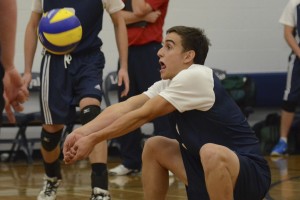The pressures of being an athlete
By Taylor Renkema
Courtesy of The Varsity Voice
The pressure of being a scholarship varsity athlete is just another reason to work hard and play harder for Glenn Martin.
Martin is a second-year veteran of the men’s volleyball team. The 20–year-old second-year recreation and fitness student said that come exam time, just like most athletes at Loyalist, he gets tunnel vision.
“I don’t find that either [sports or grades] are affected,” he said. “When it’s that time of year those are the only two things I’m focused on, and I let the small stuff slide.”
Men’s head coach Dave Templar said usually athletics are affected more than academics when crunch time hits.
“They know that if they’re not keeping everything in order academically, then there could be consequences athletically,” he said.
Varsity athletes must maintain a 2.0 grade-point-average, or a 60 per cent minimum.
Women’s volleyball head coach Tony Clarke said that’s not usually an issue.
“We tend to have a high number of OCAA all-academics,” he said. “That means they’ve gotten 80% or higher in their course levels.”
Templar said school should be the athletes’ top priority.
“We say right from the start, from the recruiting process all the way to graduation, they’re here to get a diploma,” he said. “They’re here for school.”
Martin said being one of just three veterans on the men’s team, there’s definitely pressure, but it’s not all from his coaches.
“As a second year I feel I have to step up as a leader because we have a young team,” he said. “I put more pressure on myself then my coaches and teammates do.”
Martin’s typical week consists of three to five hours of class, at least two days with two-hour practices, and whatever homework he has assigned.
On weekends the team has two games, and at least one away game each week. He also works for the campus recreation sports league, usually three days a week, three to five hours each shift.
Martin said it’s all about communication with his coach, teammates, and professors. He said he’s never missed an assignment deadline because of volleyball, but definitely stays busy.
“Let’s just say I have made a second home inside of [residence] commons for the past two years,” he said.
Clarke said he doesn’t want volleyball to take away from college experiences such as meeting new people and trying new things, but drinking and partying is a battle all its own.
He said he’s never had an issue with students drinking the night before games, but there are consequences for athletes who show up to practice with a hangover.
“We’ve had some issues this year with people going out on a Saturday night and still not feeling great at practice on Monday,” he said. “If we know, and we sense anything like that, we run them hard. They don’t get let off the hook easy.”
Templar said drinking has never been a big issue for him as a coach, so he hasn’t seen the need to impose a specific policy.
He said the limits have been tested in years past, but said drinking before a game just looks bad on the athlete.
He said he trusts his players will make good decisions, and if that means staying in on a night where they could go out and have some drinks then that’s a sacrifice he expects them to make.
“But at the end of the day, they’re college students,” he said. “They’re going to want to have some fun.”
 Print This Post
Print This Post







